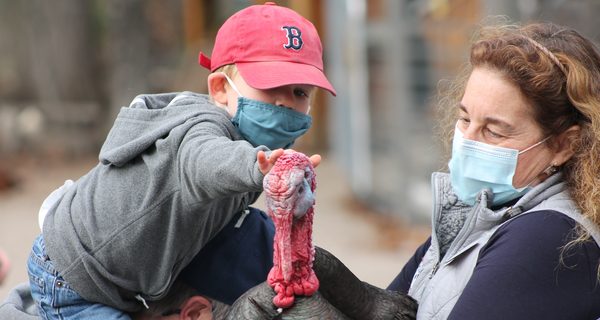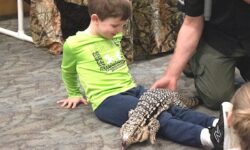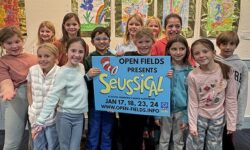A young man gets to pet the 'Handsome Paul,' the charismatic turkey that joined the tour.
By James Kinneen
Hometown Weekly Reporter
On Saturday afternoon, Unity Farm Sanctuary held one of its “Celebration of the Turkeys Tour” for people to meet their beloved turkeys, and to “take a moment to recognize their beauty and innate worth, especially before Thanksgiving.” But while there were many turkeys of differing varieties that could be spotted on the tour, it was “Handsome Paul” that was the real star of the show. But Paul didn’t join the tour right away.
While COVID-19 limited the number of people that could come on the tour, the group set out accompanied by very pleasant weather while maintaining the Unity Farm sanctioned “one cow” of distance between each other. First, the group met the goats (including some fainting goats) and saw them lying on trampolines. Unfortunately, tour guide/humane education director Marla Andrews noted that while younger goats are rumored to use the gymnastic device, all these goats do on the trampolines is eat, sleep and poop.
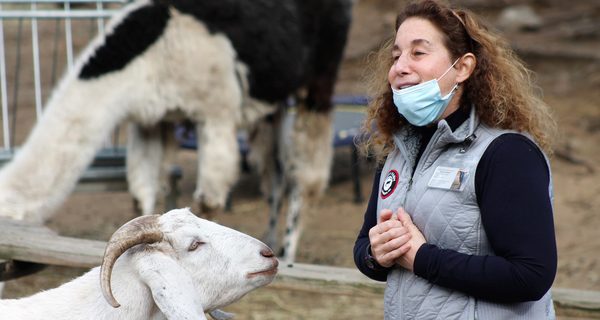
Next came the donkeys and a few horses, including a couple of miniature horses. One of the horses came from Amish Country, but was too old to pull a cart anymore, while one of the miniatures was simply too small and was suffering the health issues involved with being this size. But while the group was looking at the horses, “Handsome Paul” the turkey showed up and accompanied everyone to the cows (who were recently the subject of an article in the Christian Science Monitor), the ducks, and finally to the other turkeys.
Was Paul organically following the tour, or had someone tricked the turkey into so perfectly accompanying the turkey tour with some treats? According to Andrews, perhaps as a result of the constant positive looks of reinforcement, “Handsome Paul” follows lots of the tours, because likes the attention.
“He does. He has been following the tours around, I would say, for the past eight weeks. He’s becoming friendlier and more involved in the tours themselves, so he loves the attention. He loves people and he loves the attention. People don’t know that about turkeys. He’s pretty much a showman.”
While Paul was a brown turkey, many of the others were the broad-breasted white turkeys, the type we currently eat. Unfortunately, these turkeys have been genetically modified to grow so large, and to have such short lifespans, that they sometimes come to the farm with broken feet, unable to stand; they don’t last long under even the best circumstances, and need to have to have their food constantly monitored so they don’t gain too much weight.
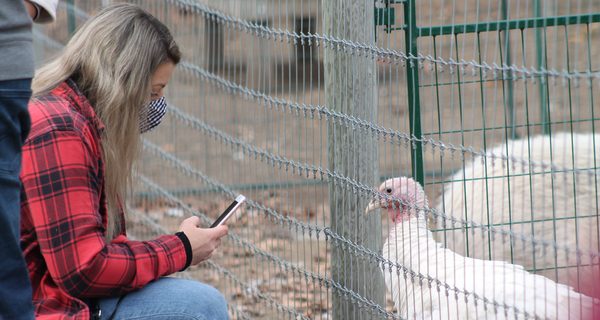
“A lot of the turkeys come from very similar circumstances. The larger ones, like the royal palms and such, are more local farms where people buy them, rescue them, they are given up by a farmer or somebody makes a deal with them. It’s not like we get a truck full of them. The white breasted ones are more direct rescues from the meat industry. They will end up here and some of them in rough shape - usually there’s some deal made with whoever’s doing the rescue - and we take them and try to rescue them. But because they are that particular breed, the white broad-breasted turkey, they’re so manipulated genetically that they don’t have a long lifespan, even when we do our heroics. We will find them unable to live past months, or if we’re lucky, maybe a year. They’re not meant to live past six months - they’re slaughtered at that. Over 250 million turkeys are slaughtered each year, and people don’t know that. They don’t think of those numbers and they certainly don’t think of these animals as individuals, it’s just ‘oh this is our tradition. But it’s a tradition filled with cruelty. And you know, we’re hoping just to enlighten people and make them think about there all their food comes from, especially this time of year when turkeys are sacrificed. And so many of them are, and they’re not allowed to have normal lifestyles. They’re not allowed to develop their normal social skills, as are most animals in factory farming.”
The tour used kid gloves in describing a lot of the animals' situations and where they came from, with Andrews noting she didn’t want to upset the children, and acknowledging that often times, they have no control over what food ends up placed in front of them. But for Andrews, the hope is that the tours will allow people to understand the unique individuality of all the animals, and to at least consider making a small lifestyle change on their behalf.
“The more we get to know animals, whether its’s a turkey or a cow, until we recognize that they are living, breathing, really individual personalities, and are seeing them up close, seeing their eyes, seeing them move and enjoy life in fresh beautiful air on a day like today, I think people will continue to turn away. Our job here is to tell the stories, over and over again, to new audiences and people coming back, and to encourage and support anyone willing to make event he smallest change. I don’t think everybody has to go, and I’m going to use a pun here, 'cold turkey,' but I think we can all do better. I don’t care if people say ‘I’m not going to have dairy on Mondays, and then maybe it continues on Tuesdays.’ I’ve learned over so many years in animal welfare that I can’t expect everyone to change on a dime, so I’ll take any little victory. But time ticks for the animals, and the animals that won’t see the benefit of somebody’s later changes. I guess our job is to speed them along as best we can.”
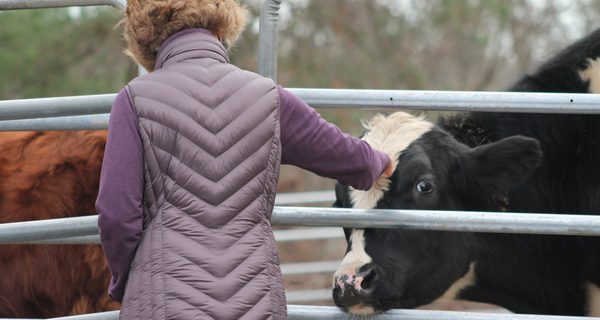
With so many families altering their traditions this year due to COVID-19, the question arises if families would be willing to ditch the turkey as well. While she acknowledged it was possible, for Andrews, the path to getting more people to not kill the animals is more about education than tradition disruption.
“Every year, I think we’re becoming more educated as a public, and more enlightened as to the plight of the animals. And that’s one of the reasons we do these types of programs: just to get people in to be with animals and experience what it’s like to be with them, and to really enjoy being around them. I mean Handsome Paul’s a silly and goofy bird. He has a personality. Some of the other ones are shyer, some of them are equally as bold. But I think they are all worthy of note. They’re individuals just like human beings are.”
While it was noted one potential positive of COVID is that a meat shortage had more people tasting meat alternatives for the first time, for animals, there have been some negatives. Many people bought “entertainment animals” like ducklings at the start of the lockdowns, only to abandon them soon after. There have also been financial impacts that have resulted in people no longer being able to care for animals like ponies and horses.
But while it can be tempting to think of Unity Farm Sanctuary as a zoo for rescued animals, that is decidedly not what the farm thinks of, or wants people to think of their animals.
“We’re not a petting zoo. I don’t want anyone to view us in that way. We have a mission here, and that’s to hopefully use our animals as ambassadors. We’ve given them the safe landing pad to live the rest of the years, and we’re carrying on with our mission of kindness, compassion and connection.”
The tours are running various days at 11 a.m. until November 28th, though you must register online to join them. To do so, visit www.unityfarmsanctuary.org.





